The University of Southern California's School of Cinematic Arts's Interactive Media & Games Division first accepted M.F.A. students in 2002. The division currently offers both undergraduate (B.A.) and graduate (M.F.A.) programs in interactive media and game design. The programs include courses in game design, development, audio, animation, and user research as well as experimental work in gestural and immersive interfaces, transmedia design, and interactive cinema.
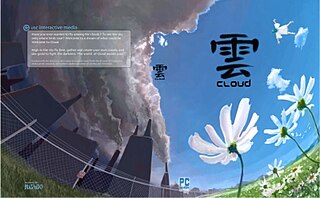
Cloud is a 2005 puzzle video game developed by a team of students in the University of Southern California's (USC) Interactive Media Program. The team began development of the game for Microsoft Windows in January 2005 with a US$20,000 grant from the USC Game Innovation Lab; the game was released as a free download that October. By July 2006, the hosting website had received 6 million visits, and the game had been downloaded 600,000 times.
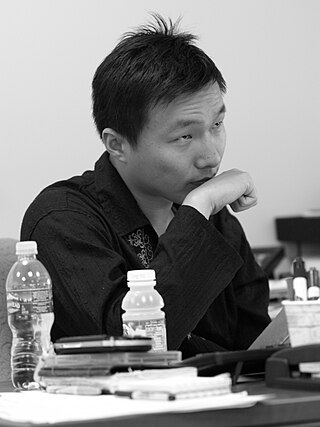
Xinghan Chen, known professionally as Jenova Chen, is a Chinese video game designer. He is the designer of the award-winning games Cloud, Flow, Flower, and Journey, and is co-founder of Thatgamecompany.

Flow is an independent video game created by Jenova Chen and Nicholas Clark. Originally released as a free Flash game in 2006 to accompany Chen's master's thesis, it was reworked into a 2007 PlayStation 3 game by his development studio, Thatgamecompany, with assistance from Santa Monica Studio. SuperVillain Studios developed a PlayStation Portable version of the game in 2008, and PlayStation 4 and PlayStation Vita versions in 2013. In Flow, the player navigates a series of two-dimensional (2D) planes with an aquatic microorganism that evolves by consuming other microorganisms. The game's design is based on Chen's research into dynamic difficulty adjustment at the University of Southern California's Interactive Media Division, and on psychologist Mihaly Csikszentmihalyi's theoretical concept of mental immersion or flow.
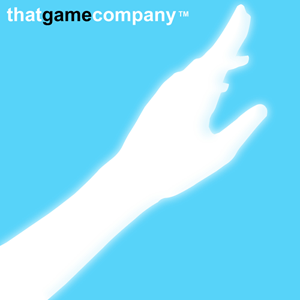
Thatgamecompany, Inc. is an American independent video game development company founded by University of Southern California students Jenova Chen and Kellee Santiago in 2006. The company was a developer for Sony Computer Entertainment, contracted to create three downloadable games for the PlayStation 3's PlayStation Network service, and has since secured independent funding. The first of their games is a remake of Chen's award-winning Flash title Flow, with enhanced visuals and sound, added multiplayer modes and compatibility with the PlayStation 3's motion-sensitive controller. The title was released on the PlayStation Store in 2007. The company's second PlayStation 3 game, Flower, was released on the PlayStation Store in 2009, and their third game, Journey, was released in March 2012 on the PlayStation Store. Their fourth game, Sky: Children of the Light, was released in July 2019 on iOS and in April 2020 on Android. Later, it released on the Nintendo Switch in June 2021 and on PlayStation 4 in December 2022.

Game Design Workshop is a book on game design by Tracy Fullerton, originally published by CMP Books in 2004. It has been updated and released in four subsequent editions, the latest by A K Peters/CRC Press in 2023.

Flower is a video game developed by Thatgamecompany and published by Sony Computer Entertainment. It was designed by Jenova Chen and Nicholas Clark and was released in February 2009 on the PlayStation 3, via the PlayStation Network. PlayStation 4 and PlayStation Vita versions of the game were ported by Bluepoint Games and released in November 2013. An iOS version was released in September 2017, and a Windows version was released in February 2019, both published by Annapurna Interactive. The game was intended as a "spiritual successor" to Flow, a previous title by Chen and Thatgamecompany. In Flower, the player controls the wind, blowing a flower petal through the air using the movement of the game controller. Flying close to flowers results in the player's petal being followed by other flower petals. Approaching flowers may also have side-effects on the game world, such as bringing vibrant color to previously dead fields or activating stationary wind turbines. The game features no text or dialogue, forming a narrative arc primarily through visual representation and emotional cues.
VVVVVV is a 2010 puzzle-platform game created by Terry Cavanagh. In the game, the player controls Captain Viridian, who must rescue their spacecrew after a teleporter malfunction caused them to be separated in Dimension VVVVVV. The gameplay is characterized by the inability of the player to jump, instead opting on controlling the direction of gravity, causing the player to fall upwards or downwards. The game consists of more than 400 individual rooms, and also supports the creation of user-created levels.

Journey is an indie adventure game developed by Thatgamecompany, published by Sony Computer Entertainment, and directed by Jenova Chen. It was released for the PlayStation 3 via PlayStation Network in March 2012 and ported to PlayStation 4 in July 2015. It was later ported to Windows in June 2019 and iOS in August 2019.
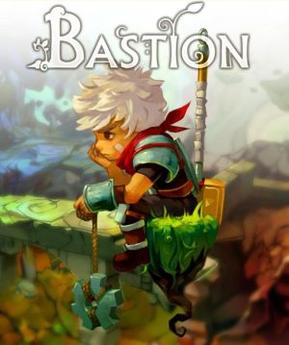
Bastion is an action role-playing video game developed by independent developer Supergiant Games and originally published in 2011 by Warner Bros. Interactive Entertainment. In the game, the player controls "the Kid" as he moves through floating, fantasy-themed environments and fights enemies of various types. It features a dynamic voiceover from a narrator, and is presented as a two-dimensional game with an isometric camera and a hand-painted, colorful art style. Bastion's story follows the Kid as he collects special shards of rock to power a structure, the Bastion, in the wake of an apocalyptic Calamity.

Robin Hunicke is an American video game designer and producer. She is a professor of game design at UC Santa Cruz and the co-founder of Funomena.
The Indie Fund is an organization created by several independent game developers to help fund budding indie video game development. The Indie Fund was created in early 2010, its purpose aimed "to encourage the next generation of game developers" by providing them funding for development of these games without the terms that would normally be associated with publication agreements.

Broken Age is a point-and-click adventure video game developed and published by Double Fine. Broken Age was game director Tim Schafer's first return to the genre since 1998's Grim Fandango, and was released for Microsoft Windows, macOS, Linux, iOS, Android, PlayStation 4, PlayStation Vita, and Xbox One platforms. The game was developed in two acts; the first was released on January 28, 2014, and the second was released on April 28, 2015. A retail version of the complete game for Windows, macOS, and Linux, published by Nordic Games, was released on April 28, 2015. A Nintendo Switch version was released on September 13, 2018.
The Critical Path Project is a video archive of interviews with video game designers and developers.

A microconsole is a home video game console that is typically powered by low-cost computing hardware, making the console lower-priced compared to other home consoles on the market. The majority of microconsoles, with a few exceptions such as the PlayStation TV and OnLive Game System, are Android-based digital media players that are bundled with gamepads and marketed as gaming devices. Such microconsoles can be connected to the television to play video games downloaded from an application store such as Google Play.
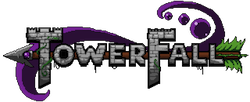
TowerFall is an action indie video game created by Maddy Thorson through her company Maddy Makes Games. In the game, players control up to four archers in a multiplayer platform fighter. It was released on the Ouya microconsole in June 2013 and was later ported to PlayStation 4, Xbox One, Linux, OS X, and Windows as TowerFall Ascension and to the Nintendo Switch under its original title of TowerFall.

That Dragon, Cancer is an art video game created by Ryan and Amy Green, Josh Larson, and a small team under the name Numinous Games. The game is an autobiography based on the Greens' experience of raising their son Joel, who was diagnosed with terminal cancer at twelve months old. Though only given a short time to live, Joel survived for four more years before succumbing to the cancer in March 2014.

Thralled is a platform puzzle video game about an 18th-century runaway slave and her baby escaping the Portuguese slave trade. The game began as a senior project in the USC Interactive Media & Games Division and later became an Ouya exclusive after being discovered by Kellee Santiago.

Night Light Interactive, LLC is an American video game company founded in 2012 and based in North Hills, California that has developed the video game Whispering Willows.
















